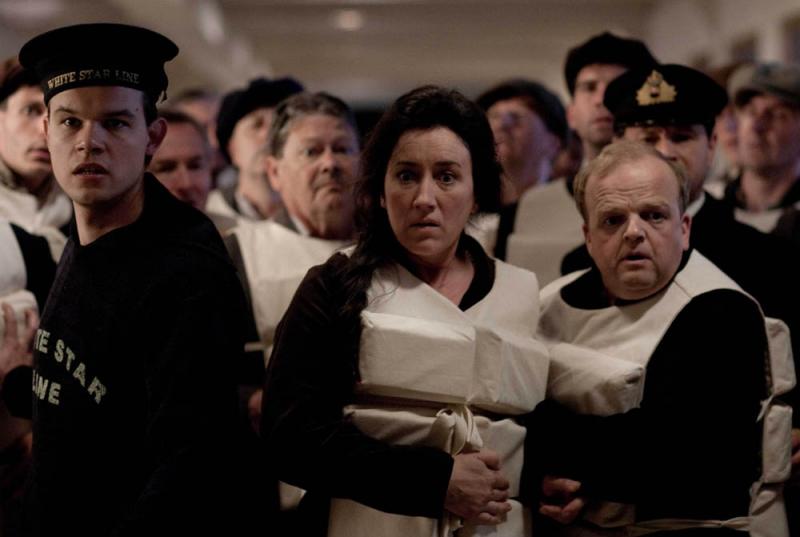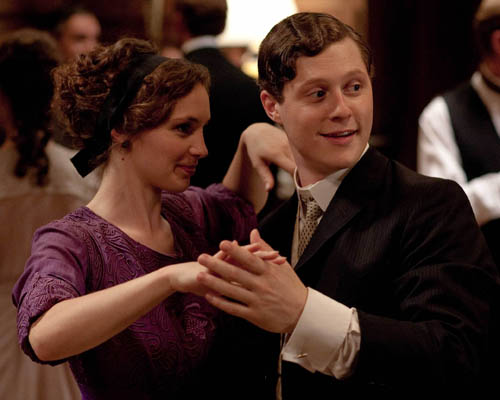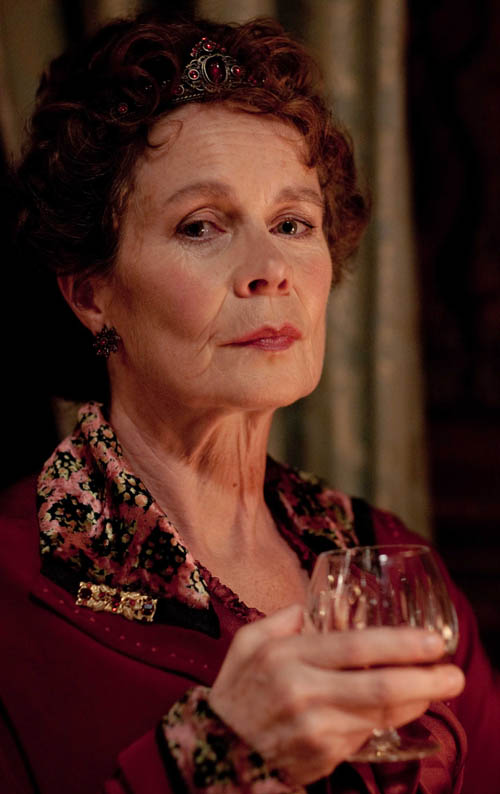Titanic, ITV1 | reviews, news & interviews
Titanic, ITV1
Titanic, ITV1
You know the story, now here's the Julian Fellowes version

Imagine my surprise when we weren't much more than halfway through this first episode, and the flipping thing hit the iceberg. But of course writer Julian Fellowes was way ahead of me, and his four-part series about RMS Unsinkable is evidently going to circle around the vessel's fate from various viewpoints in assorted time frames.
Judging by the trailer at the end, next week's is going to home in on such prickly issues as whether the Titanic was going too fast or keeping an adequate look-out for floating hazards, and whether or not she was as safe as the designers claimed. In this opener, there was a scene in which Bruce Ismay (James Wilby), supremo of the White Star Line which operated the Titanic, firmly quashed the idea of installing a possible 32 lifeboats, opting instead for a scant though still legal 16. "I will not have the promenade deck ruined or the ladies terrified out of their wits," he boomed. We were drowning in dramatic irony before they'd even started the engines.
 But most of part one was given over to a rather pernickety examination of the class structure of the Titanic's seaborne society. Deep in the bowels of the vessel, stokers shovelled coal into roaring furnaces to fuel the engines, the flames throwing diabolical shadows across sweaty faces. As the posh people ate their dinner in lavishly-appointed dining rooms, they might find themselves being served by an adventurous Italian en route to seeking his transatlantic fortune. Maids and valets of English noblemen or American billionaires jostled abrasively for position on the lower decks.
But most of part one was given over to a rather pernickety examination of the class structure of the Titanic's seaborne society. Deep in the bowels of the vessel, stokers shovelled coal into roaring furnaces to fuel the engines, the flames throwing diabolical shadows across sweaty faces. As the posh people ate their dinner in lavishly-appointed dining rooms, they might find themselves being served by an adventurous Italian en route to seeking his transatlantic fortune. Maids and valets of English noblemen or American billionaires jostled abrasively for position on the lower decks.
There were rather too many characters who remained unrecognisable or interchangeable, and though Fellowes has served up a sizeable cohort of American travellers (great for potential US sales, but historically accurate too), he hasn't avoided the curse of British actors speaking insipid pidgin Yank. It really isn't that difficult, surely? There were also a few neon-lit infomercials to fill in a bit of social background, as when the young heir from Philadelphia, Harry Widener (Noah Reid), observed, as he twirled Lady Georgiana (Perdita Weeks) round the dancefloor (pictured above), that he saw no likelihood of the British giving up their class system because it was "woven into their character."
 Fellowes has previously fallen foul of accusations that he's a true-blue toff with an unshakeable allegiance to his caste, but his portrayal of the aristocratic Brits here was anything but complimentary. We saw a lot of Hugh, Earl of Manton (Linus Roache), who made it plain to Ismay that he'd better find a suitable berth on board for his daughter Georgiana, or else. Moments earlier, we'd seen the Earl springing Georgiana from a jail full of thieves and prostitutes after she'd assaulted a policeman during a suffragette rally, and he coldly put an uppity copper in his place in the process.
Fellowes has previously fallen foul of accusations that he's a true-blue toff with an unshakeable allegiance to his caste, but his portrayal of the aristocratic Brits here was anything but complimentary. We saw a lot of Hugh, Earl of Manton (Linus Roache), who made it plain to Ismay that he'd better find a suitable berth on board for his daughter Georgiana, or else. Moments earlier, we'd seen the Earl springing Georgiana from a jail full of thieves and prostitutes after she'd assaulted a policeman during a suffragette rally, and he coldly put an uppity copper in his place in the process.
His wife, the Countess Louisa (Geraldine Somerville), then turned out to be an Olympic-class snob, shivering with disgust at virtually everyone she met on board the giant liner. Celia Imrie (pictured left), playing dog-loving nouveau riche Grace Rushton apparently in the style of Gracie Fields, was struck dumb by an acid put-down from the Countess: "We are a political family. You, I think, have always been in trade." Madame Aubart (Joséphine de la Baume), mistress of American businessman Benjamin Guggenheim, so offended Louisa's sense of decorum that she was made to leave the tea room before Her Ladyship would enter it.
Still, payback time wasn't long in coming. As the panicky passengers scrambled for the lifeboats, the Mantons were furiously denounced by defiant Irishwoman Muriel Batley (Maria Doyle Kennedy, a familiar face from the Fellowes repertory company as the first wife of Bates the valet in Downton Abbey). The Earl's infidelities were loudly announced, though it transpired that his wife had known about them all along. As the credits rolled, she was left impaled on the dilemma of whether to join the women and children in the lifeboats, or stand by her man on the tilting deck.
Explore topics
Share this article
Add comment
The future of Arts Journalism
You can stop theartsdesk.com closing!
We urgently need financing to survive. Our fundraising drive has thus far raised £49,000 but we need to reach £100,000 or we will be forced to close. Please contribute here: https://gofund.me/c3f6033d
And if you can forward this information to anyone who might assist, we’d be grateful.

Subscribe to theartsdesk.com
Thank you for continuing to read our work on theartsdesk.com. For unlimited access to every article in its entirety, including our archive of more than 15,000 pieces, we're asking for £5 per month or £40 per year. We feel it's a very good deal, and hope you do too.
To take a subscription now simply click here.
And if you're looking for that extra gift for a friend or family member, why not treat them to a theartsdesk.com gift subscription?
more TV
 Down Cemetery Road, Apple TV review - wit, grit and a twisty plot, plus Emma Thompson on top form
Mick Herron's female private investigator gets a stellar adaptation
Down Cemetery Road, Apple TV review - wit, grit and a twisty plot, plus Emma Thompson on top form
Mick Herron's female private investigator gets a stellar adaptation
 theartsdesk Q&A: director Stefano Sollima on the relevance of true crime story 'The Monster of Florence'
The director of hit TV series 'Gomorrah' examines another dark dimension of Italian culture
theartsdesk Q&A: director Stefano Sollima on the relevance of true crime story 'The Monster of Florence'
The director of hit TV series 'Gomorrah' examines another dark dimension of Italian culture
 The Monster of Florence, Netflix review - dramatisation of notorious Italian serial killer mystery
Director Stefano Sollima's four-parter makes gruelling viewing
The Monster of Florence, Netflix review - dramatisation of notorious Italian serial killer mystery
Director Stefano Sollima's four-parter makes gruelling viewing
 The Diplomat, Season 3, Netflix review - Ambassador Kate Wyler becomes America's Second Lady
Soapy transatlantic political drama keeps the Special Relationship alive
The Diplomat, Season 3, Netflix review - Ambassador Kate Wyler becomes America's Second Lady
Soapy transatlantic political drama keeps the Special Relationship alive
 The Perfect Neighbor, Netflix review - Florida found-footage documentary is a harrowing watch
Sundance winner chronicles a death that should have been prevented
The Perfect Neighbor, Netflix review - Florida found-footage documentary is a harrowing watch
Sundance winner chronicles a death that should have been prevented
 Murder Before Evensong, Acorn TV review - death comes to the picturesque village of Champton
The Rev Richard Coles's sleuthing cleric hits the screen
Murder Before Evensong, Acorn TV review - death comes to the picturesque village of Champton
The Rev Richard Coles's sleuthing cleric hits the screen
 Black Rabbit, Netflix review - grime and punishment in New York City
Jude Law and Jason Bateman tread the thin line between love and hate
Black Rabbit, Netflix review - grime and punishment in New York City
Jude Law and Jason Bateman tread the thin line between love and hate
 The Hack, ITV review - plodding anatomy of twin UK scandals
Jack Thorne's skill can't disguise the bagginess of his double-headed material
The Hack, ITV review - plodding anatomy of twin UK scandals
Jack Thorne's skill can't disguise the bagginess of his double-headed material
 Slow Horses, Series 5, Apple TV+ review - terror, trauma and impeccable comic timing
Jackson Lamb's band of MI5 misfits continues to fascinate and amuse
Slow Horses, Series 5, Apple TV+ review - terror, trauma and impeccable comic timing
Jackson Lamb's band of MI5 misfits continues to fascinate and amuse
 Coldwater, ITV1 review - horror and black comedy in the Highlands
Superb cast lights up David Ireland's cunning thriller
Coldwater, ITV1 review - horror and black comedy in the Highlands
Superb cast lights up David Ireland's cunning thriller
 Blu-ray: The Sweeney - Series One
Influential and entertaining 1970s police drama, handsomely restored
Blu-ray: The Sweeney - Series One
Influential and entertaining 1970s police drama, handsomely restored
 I Fought the Law, ITVX review - how an 800-year-old law was challenged and changed
Sheridan Smith's raw performance dominates ITV's new docudrama about injustice
I Fought the Law, ITVX review - how an 800-year-old law was challenged and changed
Sheridan Smith's raw performance dominates ITV's new docudrama about injustice

Comments
Was it any good?
Any good.? Time will tell but